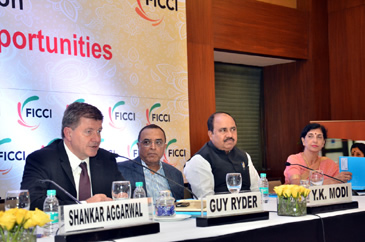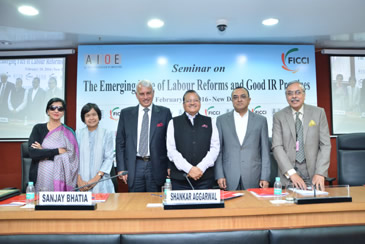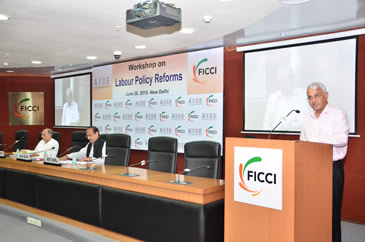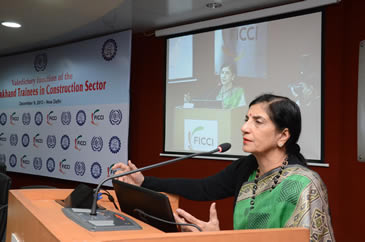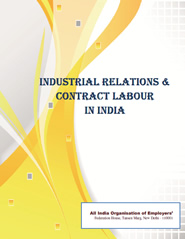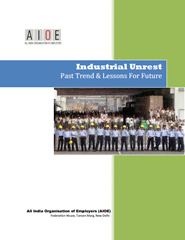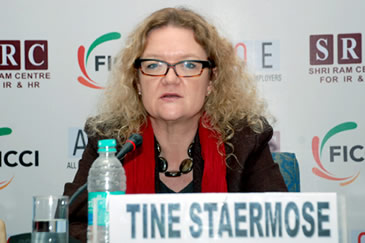The Labor & Employment division of FICCI deals with the issues of labor and Industrial Relations, Social Security and Health and Safety at the work place. This apart, the division also deals with the issues related to Affirmative Action in private sector, vocational skills assessment & certification and Private ITIs. The Labor and IR issues are looked after by an allied body of FICCI called ‘All India Organization of Employers (AIOE), which represents employers and industry in the tripartite setup of the Ministry of Labor and Employment, Government of India to evolve labor and social policies.
Team Leader
Arvind Francis
Assistant Secretary GeneralTimeline
Heat stress at workplace - Safety measures for protection
Industry should move much faster in adopting 'Occupational Safety and Health standards' irrespective of the Code: Secretary, Labour and Employment
Best Industrial Relation Practices: Presentation by Organisations
Entries invited for AIOE National Award for Outstanding Industrial Relations 2020-21
Interactive Session Transitioning to a Work-from-Home Model
Awareness Session on Latest Amendment to EPF & ESI Schemes: Updating Industry
AIOE-MSME Helpdesk Session on Occupational Health and Safety at Workplace - Part 3 - HIRA - Hazard Identification & Risk Assessment
AIOE-MSME Helpdesk Session on Occupational Health and Safety at Workplace - Part 2 - FIRE HAZARD and How to deal with it
AIOE-MSME Helpdesk Session on Occupational Health and Safety at Workplace - Part 1 - Hazards & Risks
Interactive Session on Labour Codes: Working Conditions & Industrial Relations
Need to improve women participation for economy to grow: Secretary (L&E), Ministry of Labour & Employment
AIOE Award for Outstanding Industrial Relations 2019-20
Managing Employee Exits: Legal Regime, Issues & Challenges
Webinar on Measures taken by EPFO and ESIC during COVID19 Pandemic and recent updates
Key Impact Areas Under New Labour Codes
New Labour Codes expanded the scope of engaging contract labour - Industry Experts
FICCI-AIOE-CYRIL Amarchand Mangaldas Webinar on the Changing Face of Employment Relations
Economic policies by governments will shape the trajectory of recovery: Dr Sangita Reddy, President, FICCI
Interactive Session with Shri Heeralal Samariya, Secretary (Labour & Employment), Government of India
Strengthen local institutions for sustainable growth: ILO Director
Wage code to entitle minimum wage to all 50 crore workers: Secretary, Labour and Employment
AIOE National Award for Outstanding Industrial Relations 2017-18 & 85th Annual General Meeting of AIOE
Workshop on Labour Law Amendments: Updating Managers
Workshop on Operationalising Shram Suvidha Portal and Removing Glitches
Govt. working on policy to improve working and living conditions of unorganised workforce: Labour Minister
AIOE National Award for Outstanding Industrial Relations 2016-17 & 84th Annual General Meeting of AIOE
Entries invited for AIOE "National Award for Outstanding Industrial Relations" 2016-17
FICCI welcomes North East Industrial Development Scheme (NEIDS)
FICCI welcomes government decision on fixed term employment in industry
FICCI Executive Board Member Rajeev Dubey elected to the Governing Board of ILO
Workshop on Innovative Agreements: Achieving Organisational Excellence
Training Programme on Human Resource Management Case study of Japanese Companies
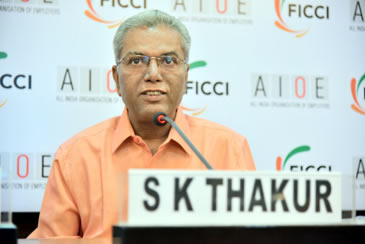
Interactive Session on ``Enhancing Competencies in Managing Social Securities (EPF and ESI)``
Technology, differentiated demographic dividend, climate change & globalization mega drivers of change in the world of work: DG ILO
Presentation on Outstanding Industrial Relations Practices
Entries invited for AIOE "National Award for Outstanding Industrial Relations" 2014-15
President of All India Organisation of Employers' submits recommendation to implement Payment of Bonus (Amendment) Act 2015 prospectively
AIOE-FICCI welcome the Maharashtra Government move towards amendments in Factories Act 1948
All India Organisation of Employers urges government to apply amended Payment of Bonus Act, 1965 prospectively from 2016-17

Seminar on "Improving Employee Relations, Competitiveness and Employment Growth Towards Futuristic Employment Policy"
Japanese Management Training Programme
FICCI & ILO sign MoU for establishing 'National Coordination Centre for Sustaining Competitive and Responsible Enterprises (SCORE) Training Services in India'
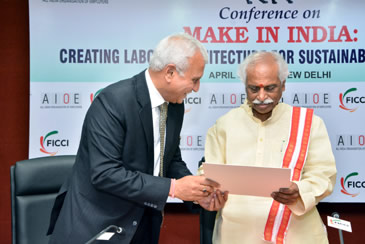
Conference on 'Make in India: Creating Labour Architecture for Sustainability and Growth'
"Every 'working place' should be a 'training place" - says Sanjay Bhatia, President' All India Organisation of Employers (AIOE) on labour reforms
FICCI lauds announcement of Labour Policy Reforms by the Prime Minister
Antiquated labour laws has blocked employment generation and competitiveness of enterprises
FICCI AIOE Suggestion for Labour Policy Reforms
"Amendment made in the Industrial Disputes Act, 1947, made during emergency, adding chapter V-B should go lock, stock and barrel" - Y K Modi, Past President FICCI
FICCI welcomes the Labour Ministry's new initiative for devising a web-portal to file compliance returns
The proposed amendments by Rajasthan Govt. in labour laws will promote employment generation

Workshop on Sexual Harassment at Workplace Bill-2012: Issue, Challenges and Compliance
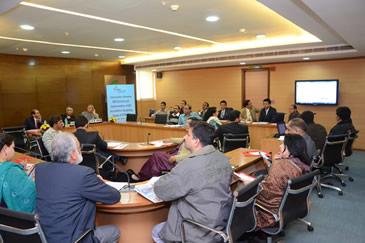
Interactive Session on MES scheme and Implementation of QCI accreditation Guidelines: Issues of VTPs/ITIs
Indian labour law needs to be reviewed and simplified FICCI President highlights five focus areas for improving industrial relations
Selection Interviews for Training of Indian Managers in Germany




